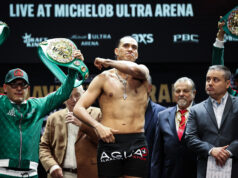
Sunday, July 4th marks the 100th anniversary of the Jack Johnson-James J. Jeffries World Heavyweight title fight. In the history of our sport, perhaps only the 1938 Joe Louis-Max Schmeling rematch surpasses the bout in terms of historical significance. Johnson was the controversial first black heavyweight champion, having defeated Tommy Burns in Australia less than two years prior. Spearheaded by famed writer Jack London, racially-motivated calls rang out from all over the country for the former champion Jeffries, retired since 1904, to return to the ring and unseat Johnson.
Promoter Tex Rickard had hoped to place the fight in Jeffries’ hometown of San Francisco, California, but the controversial nature of the fight and the sport of boxing in general at the time forced it out of the state. Rickard quickly found Reno, Nevada to be an excellent fit, as many east-west railroads met in the city. Rickard had a specially constructed stadium erected to host the fight, which would be known as the ‘Fight of the Century.’
July 4, 1910, less than 50 years since the end of the Civil War, Johnson would take on “The Great White Hope” in a bout scheduled for 45 rounds. Where the United States stood racially at the time, made the fight much bigger than boxing. That much goes without saying. However, it is interesting to note that the fight would have been significant under any circumstances. Well into the late 1960’s, Nat Fleischer would rank Jack Johnson as the greatest heavyweight champion of all-time. Fleischer, co-founder of The Ring Magazine in 1922 and its editor-in-chief until he passed away in 1972, rated him ahead of Jack Dempsey, Joe Louis, Rocky Marciano and the early reign of Muhammad Ali. Who did Fleischer rank second behind Johnson? James J. Jeffries.
The fight itself would end brutally one-sided. The time away from the ring had eroded Jeffries, who according to some reports had ballooned up to 300-pounds in his retirement. Johnson, in his physical prime, would pound away on the would-be white man’s hero for fifteen rounds before dropping him twice, the first two knockdowns of Jeffries’ career. According to some sources, it would be former champion James J. Corbett, who had been shouting back-and-forth with Johnson all fight, that would order Rickard, acting as the referee, to stop the fight.
With the press fanning the flames with their coverage of the bout, race riots would break out all over the country over the result. It would be Jeffries final bout. Johnson would go on to defend his title just once more in the U.S., before being convicted of violating the Mann Act, or “transporting women across state lines for immoral purposes.” Johnson was convicted even though the instances which prompted the charges took place before the Mann Act went into effect. Johnson was sentenced to one year and one day in prison, but skipped out on bail and left the country.
After two defenses in France, and a non-title bout in Argentina, an aging Johnson would lose the title to Jess Willard in Havana, Cuba. Johnson fought on for four years, in Spain and Mexico, before returning to the U.S. and turning himself in on July 1920. Johnson was imprisoned until July 9, 1921.
Johnson returned to the ring nearly two years after his release, fighting into his fifties. Johnson, known to drive at high speeds, died on June 10, 1946 in a car crash in North Carolina. Johnson was reportedly headed to New York to witness Joe Louis, the next black fighter to fight for and claim the heavyweight title, defend his laurels against Billy Conn.
In recent years several attempts have been made to exonerate Johnson of his violation of the Mann Act. Most recently, in April of 2009, Senator John McCain of Arizona and Representative Peter King of New York appealed to President Barack Obama for a posthumous pardon for Johnson. However last December, the U.S. Justice Department recommended against the pardon, as Justice Department pardon attorney Ronald Rodgers wrote King a letter which stated it is general policy not to process posthumous pardon cases for the reason that pardon resources “are best dedicated to requests submitted by persons who can truly benefit from a grant of the request.” President Obama has not made a public comment on the matter.
Reno-based promoters Terry and Tommy Lane of Let’s Get It On Promotions have organized a centennial celebration weekend to honor a monumental event in both the history of boxing and our country, Jack Johnson vs. James J. Jeffries. It had been the original hope that the weekend would celebrate the pardon of Johnson, as well as commemorate the 100th anniversary of the fight.
In any event, the jam-packed weekend begins this Friday with a gala hosted by boxing commentators Al Bernstein and Rich Marotta. Beginning Saturday morning, several discussions will be held by noted authors and journalists, leading in to a live boxing event held at the Grand Sierra Resort & Casino, headlined by former IBF Light Flyweight Champion Ulises Solis and televised by Fox Sports Net and Fox Sports en Espanol. On Sunday, an honorary ten-count will take place using the original ring bell at the original fight site.
For more information on the series of events, visit JohnsonJeffries2010.com.
Mario Ortega Jr. can be reached at ortega15rds@lycos.com.










